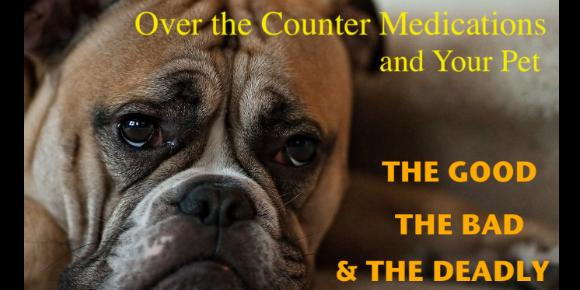OTC Medications - The Good, the Bad & the Deadly!

- posted: Dec. 05, 2019
Over the counter medications meant for human use - are they safe for my pet? We will try to examine most common medications and if they are useful or toxic. ALWAYS call and ask about any medications and the correct dosing before giving your pet medication. You can contact us at 319-277-1883 or [email protected]. Now to look at the good, the bad and the deadly…..
THE DEADLY
* Aspirin - has been found to cause bleeding in the stomach with one dose. Too high of a dose can cause stomach ulcers. Cats have a hard time metabolizing aspirin. Aspirin can be used to prevent excess clotting, but only under specific veterinary direction.
* Aleve (naproxen) - has been found to cause GI ulcers and perforation, kidney failure, and trauma to the liver. This should not be used in dogs or cats.
* Tylenol - This is severely toxic to cats - they develop severe, toxic changes to their red blood cells, and liver failure. Tylenol can cause liver failure in dogs. There can be certain indications for it’s use in dogs, but only after careful consultation with a veterinarian.
* Ibuprofen - Toxic to cats and dogs. It can cause GI ulcers or perforation, bleeding, seizures, vomiting and diarrhea. This can not be given at any time
* Enemas - (Fleet or phosphate enema) - Toxic to cats and dogs. These can change the delicate electrolyte balance in the body and cause seizures, heart disturbances, severe dehydration, and acute death.
THE BAD
* Pepto bismol - Is used to treat diarrhea in humans. It is toxic to cats and should not be used- they lack the ability to metabolize the main ingredient. Dogs can take it, but it will turn the stool a black color and interfere with radiographic imaging - so it is not an ideal medication.
* Immodium/Kaopectate - Toxic and not recommended in cats. Can be used with extreme caution in dogs, but can cause constipation, bloat, sedation or other toxic changes to the intestines.
* Hydrogen peroxide - This can be used to induce vomiting if an animal has eaten something they shouldn’t have. However, too much can cause esophageal or stomach ulcerations. Always call to check prior to inducing vomiting, some things can be made worse if vomiting is started. The dose is approximately 0.5 - 1ml of peroxide/# of body weight.
* Toothpaste - Human toothpaste has a different pH than what is safe for pets. Most human toothpastes also have fluoride in them and it is best for that not to be swallowed. Pet toothpastes, however, are completely safe to use and be swallowed.
THE GOOD
* Benadryl - This antihistamine can be used to help cats and dogs that are fighting with side effects of allergies.
* Zyrtec (not D) - An antihistamine that can also be used to help with allergies.
* Chlorpheniramine - An antihistamine that can also be used to help with allergies.
- Dr. Wendi Goetsch


